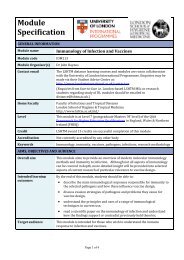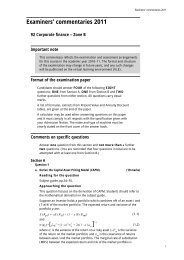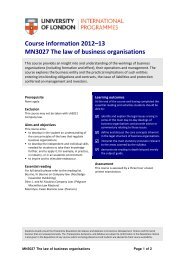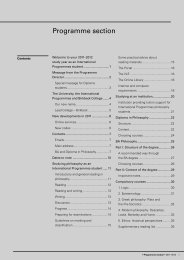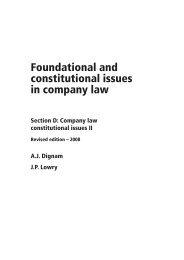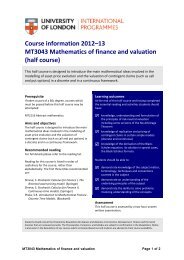Principles of sociology - University of London International ...
Principles of sociology - University of London International ...
Principles of sociology - University of London International ...
You also want an ePaper? Increase the reach of your titles
YUMPU automatically turns print PDFs into web optimized ePapers that Google loves.
21 <strong>Principles</strong> <strong>of</strong> <strong>sociology</strong><br />
44<br />
validity <strong>of</strong> IQ tests, arguing that they do not really measure natural intelligence as they<br />
favour middle-class children over working-class children and favour abstract thinking<br />
skills as opposed to practical skills. So although IQ data may well be reliable, with<br />
researchers using the same methods getting the same results, they may not be a valid<br />
measures <strong>of</strong> intelligence.<br />
Internal validity is concerned with whether the conclusion that is drawn<br />
about the relationship between two or more different things is justified.<br />
For example, a researcher may claim that (a) causes (b). However, the<br />
relationship between (a) and (b) may be the result <strong>of</strong> something else.<br />
Again we can illustrate this with a problem from our study <strong>of</strong> <strong>sociology</strong><br />
students.<br />
Research example: internal validity<br />
We were also asked to see if there was any relationship between students’ social<br />
background and their exam performance. Suppose we find that students from ethnic<br />
group A get higher marks on average than students in ethnic group B. We might then<br />
conclude that there is a relationship – or correlation – between ethnicity and educational<br />
achievement.<br />
However, such a conclusion might not be justified. Further research, might show that<br />
students in the ‘underachieving’ ethnic group B are also, on average, much poorer. They<br />
have less money for books, less space at home to study and the have to work longer<br />
hours outside college to afford the fees. Therefore, we might conclude that differences<br />
we observed are the results <strong>of</strong> relative poverty rather than ethnicity and the original<br />
conclusion lacks internal validity.<br />
Activity 2.3 Reliability and construct and internal validity<br />
Without looking back:<br />
• Try to explain the difference between reliability and validity.<br />
• What is the difference between construct validity and internal validity?<br />
• Can you think <strong>of</strong> another imaginary example <strong>of</strong> how a study might lack either<br />
construct or internal validity?<br />
Check your answers with this subject guide and your <strong>sociology</strong> textbooks.<br />
The question you should be asking yourself is not, ‘Have I learned this?’<br />
but rather, ‘Have I understood this?’ This is why attempting the third<br />
question is particularly important, because being able to answer it shows<br />
understanding.<br />
Don’t worry if you are finding some <strong>of</strong> this puzzling. We shall be looking<br />
at reliability and validity again. Some <strong>of</strong> you will have <strong>sociology</strong> teachers.<br />
Although they are not there to ‘spoon-feed’ you with the answers, they will<br />
help you with things you don’t understand.<br />
You will also have encountered these ideas when you studied 04A<br />
Statistics 1.<br />
Ecological validity<br />
The criterion <strong>of</strong> ecological validity is concerned with whether the results<br />
<strong>of</strong> social scientific research are actually applicable to the reality <strong>of</strong> people’s<br />
everyday lives. This is a criterion that is much more specific to <strong>sociology</strong><br />
than to the other social sciences.<br />
Again, we can illustrate ecological validity with an example and an activity<br />
from our study <strong>of</strong> <strong>sociology</strong> students.





